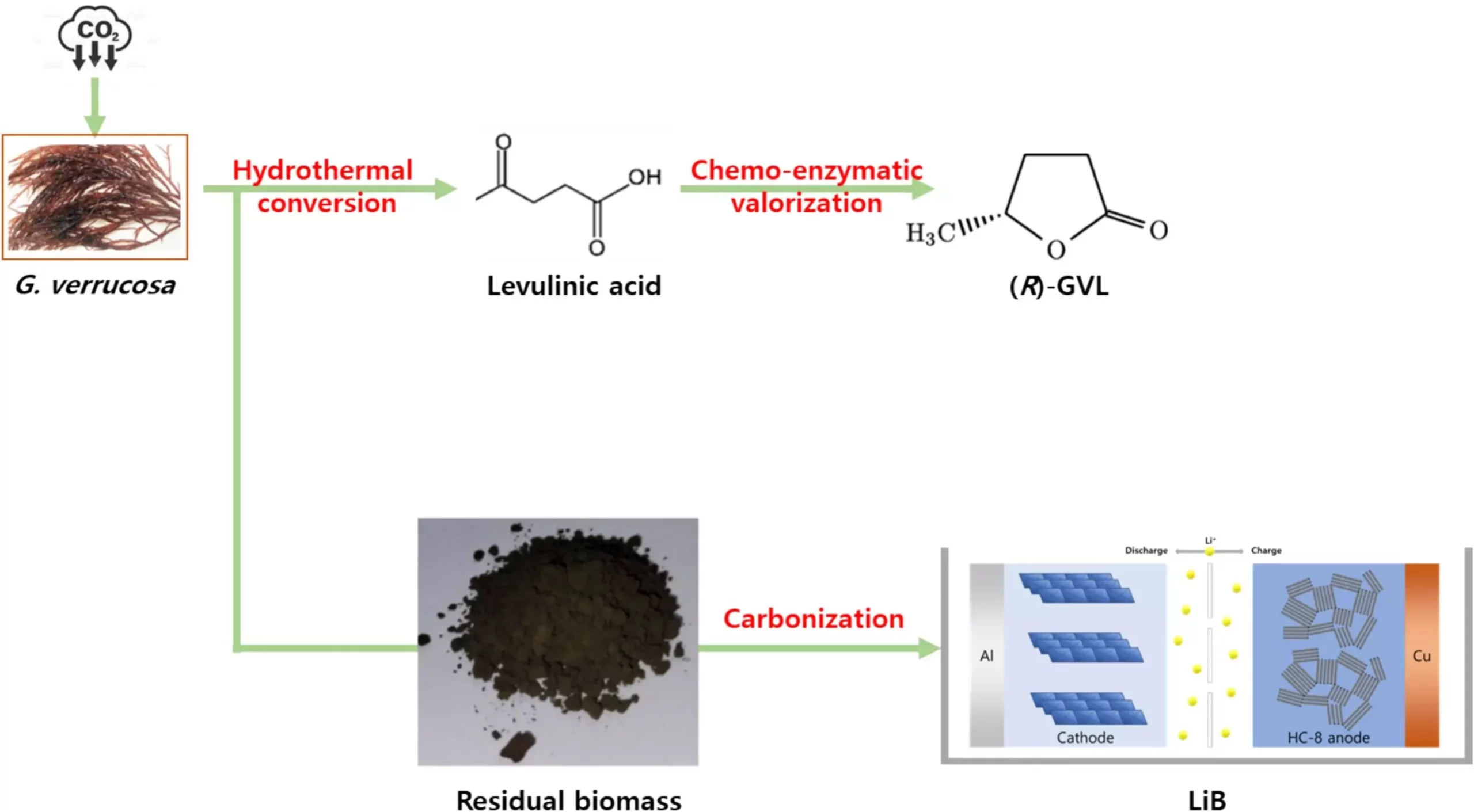Recent advancements in biotechnology have opened up new avenues for utilizing marine resources, particularly common seaweeds such as Kkosiraegi, traditionally used in culinary practices. A groundbreaking study conducted by Dr. Kyoungseon Min and her research team at the Gwangju Clean Energy Research Center, in partnership with Kangwon National University, reveals a novel process that transforms seaweed into valuable precursors for bio-aviation fuels and energy storage applications. Their findings, published in the Chemical Engineering Journal, highlight the potential of marine biomass in the quest for sustainable energy solutions.
The urgency to find alternatives to petroleum-based fuels has intensified due to the pressing need to reduce greenhouse gas emissions. The bio-aviation fuel market is projected to capture a staggering 35% of the total aviation fuel market by 2070. One of the key advantages of bio-aviation fuel is its ability to mitigate greenhouse gas emissions by up to 82% compared to traditional aviation fuel. Given these promising statistics, the utilization of marine biomass, particularly seaweed, has emerged as a viable strategy for producing eco-friendly fuels and chemicals.
The need for environmentally friendly aviation fuels has led to various production methods, with the sugar-to-jet technology emerging as one of the most commercially viable approaches. However, this process is not without its challenges; it involves a complex pre-treatment stage that consumes high-pressure hydrogen, increasing overall production costs. Moreover, the yield from fermentable sugars is disappointingly low, with only about 15% converted into useful precursors.
A Revolutionary One-Step Process
To address the limitations of existing methods, Dr. Min’s research team has pioneered a levulinic acid-based approach that facilitates a direct one-step enzymatic process. This innovative technique allows for the conversion of seaweed into levulinic acid using just a simple acid treatment. Following this, an engineered enzyme—developed specifically for this purpose—catalyzes the conversion of levulinic acid into (R)-gamma-valerolactone [(R)-GVL], a high-value product that holds significant potential.
This one-step enzymatic process represents a significant leap forward, producing ten times more precursor from the same amount of biomass compared to conventional microbial fermentation methods. With the production of optically pure (R)-GVL, there also comes an opportunity for its application in biopharmaceuticals, including treatments for hypertension. This focus on enantioselectivity—ensuring the selective production of (R)-GVL—emphasizes the process’s potential beyond energy solutions.
The differentiation between optical isomers is particularly crucial in pharmaceuticals, where the efficacy and safety of a drug can hinge on its molecular structure. Traditional catalysts used for biomass conversion yield a mixture of both (R)- and (S)- forms of GVL, which significantly limits their applications in industries like bioplastics and biopharmaceuticals. However, the engineered enzyme developed by Dr. Min’s team boasts an impressive accuracy rate of over 99.999% in converting levulinic acid into (R)-GVL, positioning it as a game-changer in the field.
This technological advancement not only emphasizes the potential for (R)-GVL in drug development but also indicates a shift in the capabilities of biorefineries to produce specialized chemicals previously deemed unattainable.
Energy Storage Potential from Seaweed Residuals
In addition to its applications in biofuels and pharmaceuticals, the residual biomass from the Kkosiraegi seaweed post levulinic acid production holds significant promise as an anode material for lithium-ion batteries. Through a carbonization process, the research team transformed this leftover material into “hard carbon,” demonstrating its effectiveness as an electrode in energy storage systems.
Initial analyses on the capacity, output, and lifespan of batteries using this novel anode material revealed encouraging results, highlighting its viability for large-scale applications.
Dr. Kyoungseon Min underscores the geopolitical advantages of Korea, positioned on three sides by the sea, in harnessing the resources of marine biomass. This research encapsulates a broader movement toward sustainable practices in energy production and materials science. By transforming seaweed into high-value products and utilizing remaining biomass, this innovative approach bridges multiple industrial sectors, propelling us closer to a future where renewable energy and sustainability coexist harmoniously.
The integration of marine biomass into biorefineries is not only a vital step in addressing current energy challenges but also paves the way for a cleaner, more sustainable tomorrow. By championing technologies that fully exploit marine resources, we stand at the forefront of a transformative shift in energy production and environmental stewardship.

